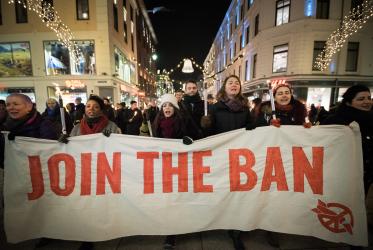In early August, World Council of Churches (WCC) representatives will embark on an unusual pilgrimage. A group of church leaders will travel to two cities devastated by the deadliest of weapons 70 years ago, then visit governments still willing to destroy thousands of cities in similar fashion today.
The Japanese cities of Hiroshima and Nagasaki were attacked with atomic bombs on 6 and 9 August 1945. A lifetime after that fearsome destruction, 40 governments still rely on nuclear weapons. Nine states possess nuclear arsenals and 31 other states are willing to have the United States use nuclear weapons on their behalf.
Church leaders from eight of these countries will make the WCC pilgrimage to Hiroshima and Nagasaki, where they will listen to survivors, pray with local churches and reflect with other faiths on the plight of the two cities. Then the bishops and church presidents will bring calls for action home from the two cities. One key step is to urge their governments to join a new inter-governmental pledge to “close the legal gap” and establish a formal ban on nuclear weapons. This humanitarian initiative already has the support of 110 countries.
“The 70th anniversary of the atomic bombings is a significant milestone,” said Peter Prove, director of the WCC’s Commission of the Churches on International Affairs. “It is timely because most of the survivors of the 1945 attacks are now in their 80s. Their cries of ‘never again’ must still be heard. It is urgent because the nuclear powers are all modernizing their nuclear weapons instead of abolishing them as promised. It is also hopeful because a growing international majority is forming to ban nuclear weapons and WCC member churches are involved.”
The eight member churches involved in the pilgrimage are well-placed to take a stand against the world’s most destructive weapons. Their governments – the US, Germany, Japan, South Korea, Canada, Netherlands, Norway and Pakistan – all avow support for nuclear disarmament, but continue to rely on the very weapons that caused such destruction 70 years ago and pose a threat to humanity today. Except for Pakistan, which has its own nuclear arsenal, all of these governments are prepared for the US to use its nuclear weapons against their enemies. Four accept this Cold War-like posture as members of NATO. Two, Japan and Republic of Korea, do so as US allies in the Pacific. Churches from this group of countries are well-placed to apply ecumenical policy opposing nuclear weapons and exert constructive pressure on their governments today.
Current events give this year’s anniversary added significance. Rhetoric about nuclear weapons is being used in the crisis over Ukraine. And last month a major arms control conference at the United Nations collapsed amid strong nuclear-weapon-state resistance to the majority of states which support the humanitarian initiative against nuclear weapons.
Most of the church leaders on the pilgrimage are from nuclear-dependent allies of the United States. The humanitarian initiative is consistent with values their governments often espouse. Yet they feel obliged to stand with their nuclear-armed ally, the US, against the initiative. In recent months wide circles of civil society including WCC member churches are increasingly asking these governments a question the church leaders will hear in Japan: Why are nuclear weapons still legal when all other weapons of mass destruction are banned?
“This pilgrimage will end by bringing a moral and spiritual critique of the dilemma that began with the attack on Hiroshima 70 years ago to governments that still depend on nuclear weapons today,” said Dr Isabel Apawo Phiri, WCC associate general secretary. “The goal is to help foreign policy officials appreciate the unique opportunity at hand, namely, to align with the majority and promote the common good rather than perpetuate the dangerous, unjust and unstable status quo.”
The mission to Japan and the seven other nuclear-dependent countries is part of the WCC Pilgrimage of Justice and Peace.
The delegation members are Bishop Mary Ann Swenson, United Methodist Church, vice-moderator of the WCC Central Committee and head of the delegation; Rev. Dr Chang Sang, Presbyterian Church in the Republic of Korea, WCC Asia president; Bishop Dr Heinrich Bedford-Strohm, chair of the Council of the Evangelical Church in Germany (EKD); Rev. Baekki Heo of the Korean Christian Church in Japan; and, for part of the programme, Archbishop Nathaniel Uematsu of the Anglican Church in Japan; Bishop Tor Berger Jorgensen, Church of Norway; Rev. Karin van den Broeke, Moderator of the General Synod of the Protestant Church in the Netherlands; Bishop Samuel Azariah, Church of Pakistan; Rev. Dr Stephen Sidorak, United Methodist Church ecumenical officer based in the USA and member of the CCIA; plus International Affairs director Peter Prove and consultant Jonathan Frerichs of the WCC.
WCC Pilgrimage of Justice and Peace







